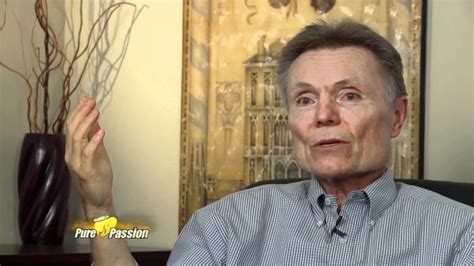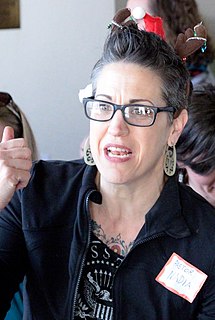A Quote by T. D. Jakes
We develop our propensity to forgive or not to forgive by what we see illustrated at the early ages of our development.
Quote Topics
Related Quotes
Forgiveness is a strange thing. It can sometimes be easier to forgive our enemies than our friends. It can be hardest of all to forgive people we love. Like all of life's important coping skills, the ability to forgive and the capacity to let go of resentments most likely take root very early in our lives.
We forgive, if we are wise, not for the other person, but for ourselves. We forgive, not to erase a wrong, but to relieve the residue of the wrong that is alive within us. We forgive because it is less painful than holding on to resentment. We forgive because without it we condemn ourselves to repeating endlessly the very trauma or situation that hurt us so. We forgive because ultimately it is the smartest action to take on our own behalf. We forgive because it restores to us a sense of inner balance.
You must forgive everyone. Now many would say that "We cannot forgive, it's very difficult." But it's a myth whether you forgive or don't forgive. What do you do? You don't do anything. But when you don't forgive, then you are playing into wrong hands. That means you are torturing yourself, while those who have troubled you are quite happy.
To forgive the incessant provocations of daily life - to keep on forgiving the bossy mother-in-law, the bullying husband, the nagging wife, the selfish daughter, the deceitful son - how can we do it? Only, I think, by remembering where we stand, by meaning our words when we say in our prayers each night, “Forgive our trespasses as we forgive those who trespass against us.” We are offered forgiveness on no other terms. To refuse it is to refuse God’s mercy for ourselves. There is no hint of exceptions and God means what he says.
The Risen Christ proclaimed not that we 'have to forgive,' but rather, that at last we CAN forgive-and thereby free ourselves from consuming bitterness and the offender from our binding condemnation. This process requires genuine human anger and grief, plus-and here is the awful cost of such freedom-a humble willingness to see the offender as God sees that person, in all his or her terrible brokenness and need for God's saving power. I would never tell another, 'You have to forgive.'
Forgive yourself for not being the richest, the thinnest, the tallest, the one with the best hair. Forgive yourself for not being the most successful, the cutest or the one with the fastest time. Forgive yourself for not winning every round. Forgive yourself for being afraid. But don’t let yourself off the hook, never forgive yourself, for not caring or not trying.
We all commit our crimes. The thing is to not lie about them -- to try to understand what you have done, why you have done it. That way, you can begin to forgive yourself. That's very important. If you don't forgive yourself you'll never be able to forgive anybody else and you'll go on committing the same crimes forever.
If we can forgive everyone, regardless of what he or she may have done, we nourish the soul and allow our whole being to feel good. To hold a grudge against anyone is like carrying the devil on your shoulders. It is our willingness to forgive and forget that casts away such a burden and brings light into our hearts, freeing us from many ill feelings against our fellow human beings.





































